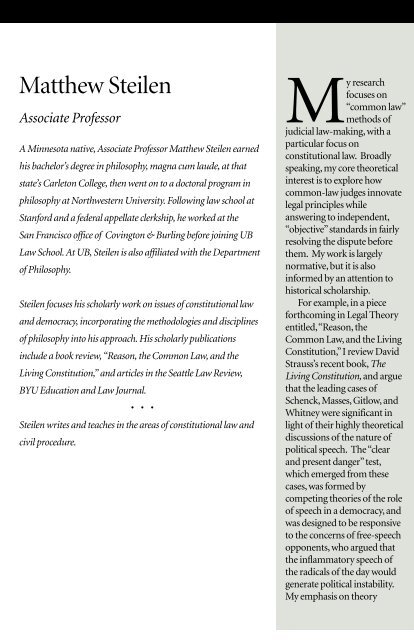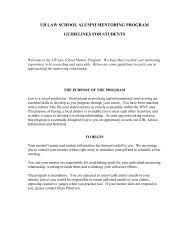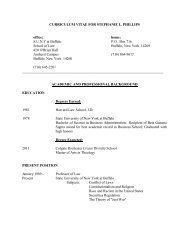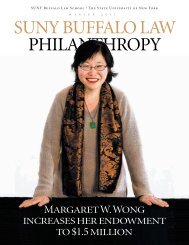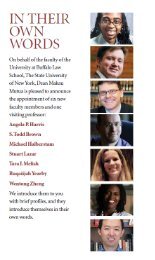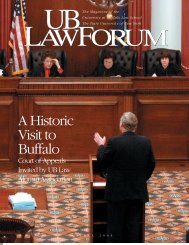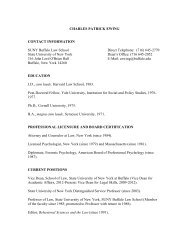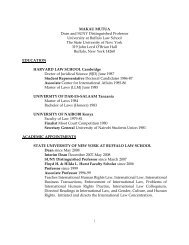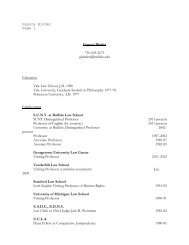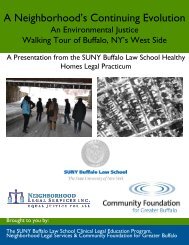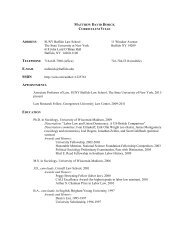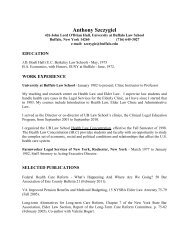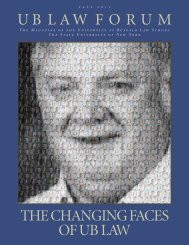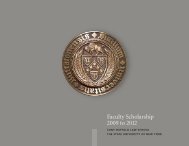Introducing Kim Diana Connolly, Samantha Barbas, Matthew Dimick ...
Introducing Kim Diana Connolly, Samantha Barbas, Matthew Dimick ...
Introducing Kim Diana Connolly, Samantha Barbas, Matthew Dimick ...
Create successful ePaper yourself
Turn your PDF publications into a flip-book with our unique Google optimized e-Paper software.
<strong>Matthew</strong> Steilen<br />
Associate Professor<br />
A Minnesota native, Associate Professor <strong>Matthew</strong> Steilen earned<br />
his bachelor’s degree in philosophy, magna cum laude, at that<br />
state’s Carleton College, then went on to a doctoral program in<br />
philosophy at Northwestern University. Following law school at<br />
Stanford and a federal appellate clerkship, he worked at the<br />
San Francisco office of Covington & Burling before joining UB<br />
Law School. At UB, Steilen is also affiliated with the Department<br />
of Philosophy.<br />
Steilen focuses his scholarly work on issues of constitutional law<br />
and democracy, incorporating the methodologies and disciplines<br />
of philosophy into his approach. His scholarly publications<br />
include a book review, “Reason, the Common Law, and the<br />
Living Constitution,” and articles in the Seattle Law Review,<br />
BYU Education and Law Journal.<br />
• • •<br />
Steilen writes and teaches in the areas of constitutional law and<br />
civil procedure.<br />
My research<br />
focuses on<br />
“common law”<br />
methods of<br />
judicial law-making, with a<br />
particular focus on<br />
constitutional law. Broadly<br />
speaking, my core theoretical<br />
interest is to explore how<br />
common-law judges innovate<br />
legal principles while<br />
answering to independent,<br />
“objective”standards in fairly<br />
resolving the dispute before<br />
them. My work is largely<br />
normative, but it is also<br />
informed by an attention to<br />
historical scholarship.<br />
For example, in a piece<br />
forthcoming in Legal Theory<br />
entitled,“Reason, the<br />
Common Law, and the Living<br />
Constitution,”I review David<br />
Strauss’s recent book, The<br />
Living Constitution, and argue<br />
that the leading cases of<br />
Schenck, Masses, Gitlow, and<br />
Whitney were significant in<br />
light of their highly theoretical<br />
discussions of the nature of<br />
political speech. The “clear<br />
and present danger”test,<br />
which emerged from these<br />
cases, was formed by<br />
competing theories of the role<br />
of speech in a democracy, and<br />
was designed to be responsive<br />
to the concerns of free-speech<br />
opponents, who argued that<br />
the inflammatory speech of<br />
the radicals of the day would<br />
generate political instability.<br />
My emphasis on theory<br />
contrasts with the dominant<br />
“Burkean”account of<br />
common law<br />
constitutionalism, which<br />
Strauss and others have<br />
adopted. According to that<br />
view, the common law is<br />
characterized as a theoretically<br />
modest, empirically confirmed<br />
body of judicial precedents. I<br />
believe this account fails to<br />
describe the development of<br />
First Amendment law in<br />
Schenck and the cases that<br />
followed.<br />
A second forthcoming<br />
piece,“The Democratic<br />
Common Law,”builds on<br />
these themes in an effort to<br />
show how judge-made law fits<br />
naturally within a democracy<br />
like our own. According to the<br />
view I defend there, judgemade<br />
law enjoys the same kind<br />
of legitimacy as legislation—<br />
call it “democratic<br />
legitimacy”—when it emerges<br />
out of a process in which<br />
individuals exchange reasons<br />
about what course of collective<br />
action is appropriate. In my<br />
view, common-law<br />
adjudication is such a process.<br />
To show how it is, I examine<br />
both the so-called “classical”<br />
account of the common law<br />
associated with English jurists<br />
<strong>Matthew</strong> Hale and Edward<br />
Coke, as well as modern work<br />
on the common law by Fred<br />
Schauer, Edward Levi, and<br />
Martin Golding.<br />
Together, these articles<br />
advance a broader goal in my<br />
scholarship: to describe an<br />
active and innovative role for<br />
the judiciary within our<br />
democratic political system. In<br />
“Minimalism and Deliberative<br />
Democracy,”33 Seattle U.L.<br />
Rev. 391 (2010), and elsewhere,<br />
I have tried to provide a<br />
normative framework for<br />
justifying and directing our<br />
ongoing practice of judicial<br />
law-making.


